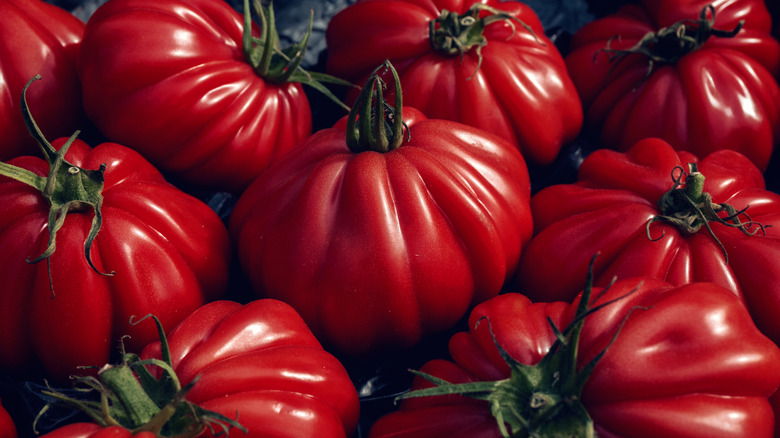Why Beefsteak Tomatoes Are Named After A Meaty Dish
You might add tomatoes to your shopping list often, as their versatility makes them a worthy addition to casseroles, soups, and salads. Tomatoes come in many varieties, like cherry, Roma, and grape, each boasting a different texture, flavor, and use. One type that is hard to miss is the beefsteak tomato: It is one of the largest varieties, weighing anywhere from a whopping 1 to 4 pounds each.
The beefsteak name can be attributed to a few reasons, like its meaty texture, similar to a steak or thick slice of beef. Beefsteaks also have smaller seed cavities than other tomatoes, leaving room for more meat-like flesh. These beefy tomatoes are classified by their shape, containing different subtypes like Red Ponderosa, Coustralee, and Brandywines. They range in color from red, pink, and orange and can be anywhere from tart to sweet in taste.
Beefsteak tomatoes are seriously versatile
Like the counterpart they were named after, beefsteak tomatoes are an excellent addition to sandwiches and burgers. Their firm texture will hold well amongst other ingredients, giving you a meaty, juicy bite. You can't go wrong with a classic BLT or a simple tomato sandwich. Beefsteak varieties are also perfect for roasted tomatoes since they won't fall apart when cooked, leaving you with a soft and jammy interior. Another easy side to make is a refreshing tomato salad. It can be as simple as sliced tomatoes, mozzarella, and basil — but with a promise that this beefy veggie won't disintegrate or go mushy.
For something a little fancier, the size of these tomatoes makes them just right for a stuffed tomato dish. You'll need to scoop the insides out before stuffing them, but keep the flesh for a homemade salsa or tomato sauce. You can even fry the slices like fried green tomatoes for a crunchy yet soft-on-the-inside treat. Seriously, what can't beefsteak tomatoes do?

